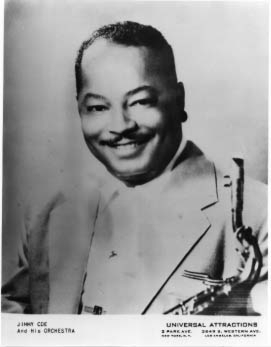

Revision note:Further releases involving Jimmy Coe have come to light, including two rockabilly singles by Jimmy Ganzberg from 1959 and an LP from 1972.
Very little has been written about this excellent musician. Until 2002, the only published sources on Jimmy Coe were Bob Koester's liner notes to Delmark LP 443, which collects his recordings as a leader for United and States, and a biographical entry in the New Grove Encyclopedia of Jazz (but that, in turn, was based on an earlier version of this page). For a musician who made significant recordings under his own name (including a nice session for King in 1952 and those two sterling sessions for United/States in 1953) and worked with such jazz luminaries as Dave Baker, Slide Hampton, Freddie Hubbard, Wes Montgomery, Carl Perkins (the pianist), Larry Ridley, and Leroy Vinnegar, such neglect is uncalled for.
James R. Coe was born in Tompkinsville, Kentucky, on March 20, 1921. According to the Kentucky Birth Index, his name at birth was James R. West, and his mother's name was Mary Wilborn (many thanks to Eric LeBlanc for obtaining this information). Most likely he was adopted by his stepfather after his mother married William Coe.
According to Dan Kochakian's interview with him (April 17, 2002), here is how the Jimmy Coe story began
I was born in Tompkinsville, Kentucky, on March 20, 1921. My parents weren't into music too much, but I had a cousin who stayed with us. She was a 300-pounder and she could sing her butt off and sang around the house. That might be what started me liking music. Her name was Lottie Williams and she sang all kinds of music, pop tunes, gospel, all of it. My father, whose name was William McKinley Coe, played violin and he bought me a small violin, the three-quarter size. My mother's name was Mary Lee Wilburn Coe. My family moved to Indianapolis when I was two years old. I started playing piano. We had an old player piano back in the 1920's that you had to pump the pedals. I started learning tunes off that and I would go to parties when I got to be 14 or 15. When I started banging on the piano, I'd look up and everybody was gone, especially the girls. But I liked the piano and was thinking about being a piano player.
Except for periods on the road and service in World War II (1943-1945), Jimmy Coe has remained in Indianapolis during his entire career. Naptown was never a recording center; before the 1960s any recordings that Coe was able to make were done elsewhere. We have included him in the Red Saunders Research Foundation pages because he cut significant work as a leader in Chicago.
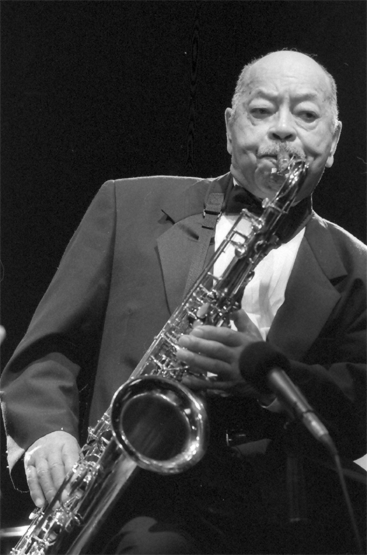
Jimmy Coe didn't pick up the instrument he was going to play professionally until he was 16--rather late for a young musician in those days. He had started on clarinet as a sophomore at Crispus Attucks High School, practicing 4 or 5 hours a day, but couldn't get into the school band. As he told Dan Kochakian:
The first band I played with was a group of fellows. We had our first job, a one-night stand, in a little suburb called Ravenswood, just outside of Indianapolis. We played a nightclub out there and we didn't know but three tunes! I was playing clarinet and Filmore Hutchins played trumpet. The drummer was Hugh Watts. He's preaching now. On piano, we had Erroll Grandy. He was the godfather of every good musician in Indianapolis. When I first met him in high school, he was almost legally blind. He had perfect pitch, just uncanny. If you dropped a quarter on the floor, he could tell you what note that was! Erroll went to Butler University to the music school and they tried to teach him how to read Braille. That's a very slow process, so the teachers started playing 4 or 5 bars of a classical tune and he'd play it back to them. He was like Charlie Parker. Whatever he thought in his mind, he could do with his fingers. Every [Naptown] musician, including J.J. Johnson and Wes Montgomery, came through Erroll.
I played the clarinet for about 6 or 7 months and then I switched to the saxophone. I still play the clarinet. I became interested in writing and arranging music and my man was Sy Oliver who arranged with Jimmie Lunceford. I would take his records and put them on our old wind-up Victrola. You could tune it down to get it in tune with the piano and I'd copy note for note Sy's arrangements. I couldn't even tell you what a chord was, but I could write the chords out. The trombone player in the band at school showed me how to make an A Flat 6, so I figured if you can count, you can figure out anything. I was doing writing and performing about half and half. This was about 1937, '38. I graduated in '38.
Coe promptly went to work full-time in Indianapolis. As he told Dan Kochakian:
I started playing on Indiana Avenue at a place called The Cotton Club. I was 17 when I went to the Avenue. I played The Cotton Club with Clemack and the Wisdom Brothers. Walter Wisdom played piano and Fred Wisdom played trumpet. The Cotton Club had three floors. The first floor was for bands. The second floor had a show with a band and the third floor was for dancing. I was in the house band for three years. It was 4 pieces, sometimes 5 when they had a guy sit in. Then I moved across the street to the Mitchell Inn which was a step up. The Cotton Club was owned by a colored guy named Sea Ferguson who became a millionaire through real estate. In the '30's and '40's, he was buying up property as people were losing it. He bought mostly corners and later on, all the gas stations on that side of town were from him. He sold them for a heck of a profit. I'm teaching his great grandson now. He's 9 years old. Sea's brother was Denver Ferguson, the booking agent. Denver invented a numbers game. Baseball tickets. Denver would rather make $100 crooked than make $1000 straight. I also knew Sax Kari in Indianapolis. We hung out together. I gave him a couple of arrangements he wanted to borrow and he never did bring them back!
I was with Buddy Bryant's band from 1938 to 1940, and we played Joe Mitchell's. Robert Lamore was in the band with me. Robert Chambers, a patron, got shot in the Mitchell Inn, a gambling room owned by Joe Mitchell at Indiana Avenue and Senate, and they took him down the side steps and laid him on the sidewalk. En route to the hospital, he died. The next day, they closed down every colored club on the Avenue and they stayed closed for about three years. Joe Mitchell was a Jewish guy and he and his brother, Tuffy, were the numbers men in Indianapolis.
By this point there was no doubt about Jimmy Coe's ability to function in fast company. At age 20 he was already touring with the Jay McShann band, which he probably joined toward the end of 1941 (not only was it a great band, Coe was probably eager to get on the road when so many of the clubs in Naptown were closed down). He even had the unenviable task of briefly replacing Charlie Parker on alto saxophone (when the McShann band played the Apollo in New York City, April 1942). Coe always said later that Charlie Parker was in the audience—and fell asleep—while he soloed on alto for the first time during a performance! Coe played alto alongside John Jackson for a little while, but while Charlie Parker was in the band his instrument was baritone sax. Coe played baritone on one broadcast that has been preserved and on one studio session with McShann.
About working with McShann in New York, Coe told Dan Kochakian:
After we got to New York, we played a few days where we rehearsed. Jay came to me and he said, 'Man, Charlie's out of the band. You got to take his place.' I said, 'OK.' I went into rehearsal and they had three pieces of music outside of the four or five arrangements I had written for Al Hibbler and Walter Brown. Jay would start the intro and I said, 'What is that?' You know what the cat said? He said, 'You'll hear it.' They wouldn't tell you nothing! When I asked, 'Well, where's the music?' He said, 'You have to learn your part.' And that's what I did. A lot of the stuff that he made hits on were head tunes. We stayed at the Woodside Hotel on 8th Avenue and we rehearsed down there in the basement and after we'd been there about two weeks, Dizzy Gillespie and George Treadwell (he was Sarah Vaughan's husband) would come by there and get Charlie after rehearsal and they'd go. I'm not sure of the connection, but I think that's when they started concocting the bebop thing. Charlie could play anything he heard. In his mind, it'd be immediately transferred to his fingers. That's the only way I can explain it. He was nothing like the Clint Eastwood picture.
Jay McShann (p); Bernard "Buddy" Anderson (tp); Bob Merrill (tp); Orville "Piggy" Minor (tp); Lawrence Anderson (tb); Taswell "Joe" Baird (tb); Charlie Parker (as); John Jackson (as); Fred Culliver (ts); Bob Mabane (ts); Jimmy Coe (bars); Leonard "Lucky" Enois (g); Gene Ramey (b); Harold "Doc" West (d); Al Hibbler (voc).
NBC Broadcast, "Blue Network," Savoy Ballroom, New York City, February 13, 1942
| St. Louis Mood | Stash STCD542 | ||
| I Got It Bad [AH voc] | Stash STCD542 | ||
| I'm Forever Blowing Bubbles | Stash STCD542 | ||
| Hootie Blues [inc] | Stash STCD542 | ||
| Swingmatism | Stash STCD542 | ||
| Love Don't Get You Nothing but the Blues | Stash STCD542 |
Our information comes from Tom Lord's Jazz Discography. All titles also on Black Label [CD].
Jimmy Coe was present for the McShann band's legendary session of July 2, 1942.
When Charlie Parker came back to the band, they were going to put John Jackson on baritone and John said, 'If I gotta play baritone, I'm going back to Kansas City.' I said, 'That's all right. I'll play baritone,' so I played baritone with Jay and by then, he had some arrangements because I had been writing for him. I recorded with McShann on July 2, 1942, for Decca in New York City. Al Hibbler was on that session. They were some of the first commercial recordings I ever cut. I was 21 years old. (Interview with Dan Kochakian, April 17, 2002)
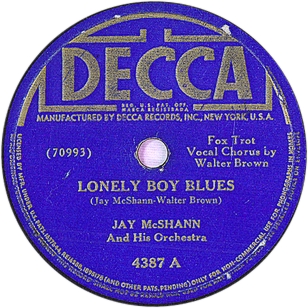
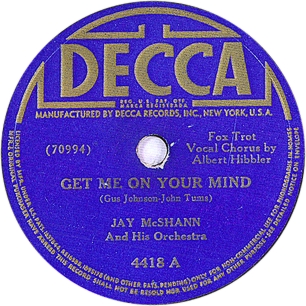
Jay McShann (p); Bernard "Buddy" Anderson (tp); Bob Merrill (tp); Orville "Piggy" Minor (tp); Lawrence Anderson (tb); Taswell "Joe" Baird (tb); Charlie Parker (as); John Jackson (as); Fred Culliver (ts); Bob Mabane (ts); Jimmy Coe (bars, arr); Leonard "Lucky" Enois (g); Gene Ramey (b); Gus Johnson (d); Albert Hibbler (voc); Walter Brown (voc); Archie "Skippy" Hall (arr); William J. Scott (arr).
New York City, July 2, 1942
| 70993-A | Lonely Boy Blues (McShann-Brown) [WB voc] | Decca 4387 A, Decca DL79236, Decca GRD614 [CD], Classics 740 [CD] | |
| 70994-A | Get Me on Your Mind (G. Johnson-J. Tums) [AH voc] | Decca 4418 A, Deeca DL5503, Decca DL79236, Decca GRD614 [CD], Classics 740 [CD] | |
| 70995-A | The Jumpin' Blues (McShann) [WB voc] | Decca 4418 B, Decca DL5503, Decca DL79236, Decca GRD614 [CD], Classics 740 [CD] | |
| 70996-A | Sepian Bounce (McShann-S. Hall) | Decca 4387 B, Decca DL5503, Decca DL79236, Decca GRD614 [CD], Classics 740 [CD] |
The session information comes from Lord's Jazz Discography. Needless to say, the presence of Charlie Parker on these sides has stimulated many more reissues than are listed here (the last three tracks have appeared on an average of 14 different releases each). For details, see Lord.
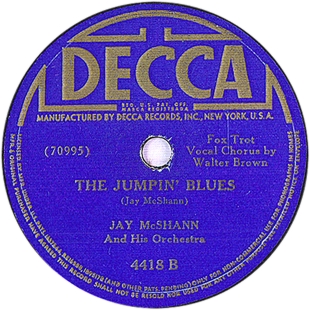
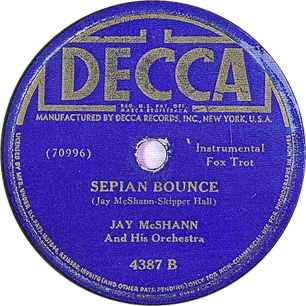
Unfortunately a recording ban started on August 1, 1942. The McShann would not record again until well in 1943, by which time neither Parker nor Coe was still there. In his interview with Dan Kochakian (April 17, 2002), Jimmy Coe stated that he left the McShann band in November 1942 and joined Tiny Bradshaw's outfit (where he replaced Bobby Plater). Coe takes some credit for promoting the transition from the two alto-two tenor sax section that most bands still carried (with perhaps some doubling on baritone) to a five-man sax section with a full-time baritonist. He told Kochakian that he wrote baritone parts for everything in the McShann book, and while in the Bradshaw band he did the same, inspiring Bradshaw to hire his own full-time baritonist when Coe left.
Of course, World War II was on and musicians were getting drafted. Jimmy Coe joined the Army. Intitially, he was stationed in Fort Custer, Michigan, in the Quartermaster Corps. After being shipped out, he played with the 415th Band while on duty in New Guinea and the Philippines. As he explained to Dan Kochakian:
In April of 1943, I went into the Army and I formed a band out of the Quartermaster outfit in Fort Custer, Michigan, of guys out of the company and we started playing little dances and PX's. There was guy who came in with a beautiful Gibson guitar and a great big amp. We had an 8-piece band, but when he fired the guitar up, he played so loud that you couldn't hear what the horns were doing. After that, I didn't want a guitar player for the Army band, but I met a white guy there named Charlie something. He could play subdued and you could feel the beat, the way it's supposed to be. Just like that cat who played with Art Tatum, Tiny Grimes...
When I got overseas, I met Lanny Ross, the old crooner. He was a Special Services officer. I took my saxophone overseas with me. I was playing alto then. Lanny provided the horns for the band and in 1943, we got made the authorized Army Services Forces band. We traveled alone. We went on the fifth largest ship in the world, The New Amsterdam from Holland. We couldn't go in a convoy. Reportedly, subs were chasing us, so we went all the way to New Zealand to refuel and then back to Sydney, Australia. I went from there to New Guinea. I was in the service for three years and spent most of my time in New Guinea and the Philippines. I took four years of French in high school and they sent me to New Guinea!
We formerly had Jimmy Coe playing tenor sax on the Buster Bennett session of October 24, 1945 (the one on which Buster addresses his tenor player as "Jimmy"). However, Coe does not mention working with Buster in his interview with Dan Kochakian; in fact, he describes mustering out of the Army in 1945 (perhaps late in the year), spending two weeks in New York. "I went into the service from New York and got out in New York. I was supposed to go back and join the band at a little club on 136th Street between 7th and 8th Avenues where they had showgirls. The night I went to the club, the music was going so fast, my head was going back and forth" and while the owner wanted to hire him, he didn't find the music or the setting to his liking. He promptly returned to Indianapolis, where he got steady work at a club called the Ritz and first met Wes Montgomery.
Coe returned to New York after rejoining the Tiny Bradshaw Orchestra, probably missing a recording opportunity or two when the American Federation of Musicians imposed its second recording ban on January 1, 1948. In the interview with Dan Kochakian he also refers to the blizzard that took place on December 26, 1947:
I didn't go back to New York until '47. When I went back, Tiny Bradshaw was fronting my band and we went to the Savoy Ballroom and put Tab Smith out of there. We kept him out of there about 21 weeks! Then we went to the Apollo where we had Big Maybelle with us. After the first time we went to the Apollo, we went on the road and stayed out about two months and went to The Apollo again. 1947 was the year Jackie Robinson got into the majors and he appeared at The Apollo with us. He didn't sing or dance, but talked to the audience. I remember that Pigmeat Markham was on that gig, too. I played the Howard Theater in Washington and also the one in Baltimore. I remember running into Jimmy Hamilton and Cozy Eggleston when I was in Chicago. We were in New York in the Savoy when the record ban hit in '47 or '48 when all the record companies froze up. I was also in New York when they had 52 inches of snow in '47! We came out of the Savoy Ballroom and nothing but a mountain of snow all across. Luckily, I lived close.
After returning to Indianapolis once again, Coe studied clarinet at Butler University for a while, and took some extended gigs at the Cotton Club in Cincinnati. His next recording session did not take place until 1952:
Another of my early recordings was done in Cincinnati for King Records. Flo Garvin was the singer and she sang so softly, they had to pad the drums, put them in a cage and muffle everything. She had a beautiful voice. I had the house band at the Cotton Club in Cincinnati and Flo sang with us for about three weeks, did the record and that was it. We were at the Cotton Club from 1950 to 1953 [more probably 1952—see below]. She still sings and plays piano. She plays in one key, F sharp. I played alto, Bill Boyd played baritone and Bob Darby played tenor. Joe Mitchell was the trumpet player. He died a few years ago. Stanley 'Stash' O'Laughlin was my piano player, but left to play with an alto player in New York. Phillip Stewart was on bass and Earl Walker was on drums. Earl left my band and went with Lionel Hampton for three years. He was the only drummer that Hamp couldn't burn out. We did two other songs for King, both instrumentals, but they put me on the label as Jimmy Cole. They were trying to associate me with Nat King Cole. I can't carry a tune in a barrel [vocally]. I only did instrumentals. That bugged the hell out of me. I got down South on a tour and it was Jimmy Cole all over the place. (Interview with Dan Kochakian, April 17, 2002)
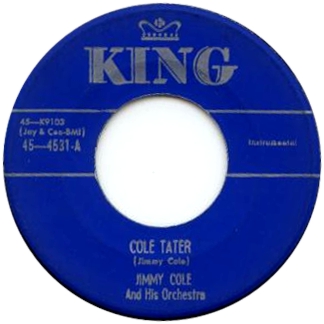
Flo Garvin (voc); Jimmy Coe (as, ldr); Joe Mitchell (tp); Robert Darby (ts); William Boyd (bars); Stanley "Stash" O'Loughlin (p); Philip Stewart (b); Earl "Fox" Walker (d).
New York City, January 11, 1952
| K9100 | I'm on the Outside Looking In (Garvin) [FG voc] | King 4518, Sing 1159 | |
| K9101 | Let Me Keep You Warm* (Garvin) [FG voc] | King 4518, Sing 1159 | |
| K9102 | I Got It Bad and That Ain't Good* (Ellington) | King 4531-AA, Vogue [Fr] V.3125 | |
| K9103 | Cole Tater* ("Cole") | King 4531-A, Vogue [Fr] V.3125 |
Thanks to Marv Goldberg and Dave Penny for bringing this session to our attention. Coe is identified as Jimmy "Cole" on the labels of King 4531, and existing discographies fail to link the two Flo Garvin sides on King 4518 to the instrumental sides on King 4531. Existing discographies have put Bill Boyd, the baritonist, in place of Philip Stewart, the bassist, and given no credit for the baritone sax. Coe gave the correct personnel for the date in his interview with Dan Kochakian.
Both singles, King 4518 and 4531, were released on 78 and 45 rpm in 1952.
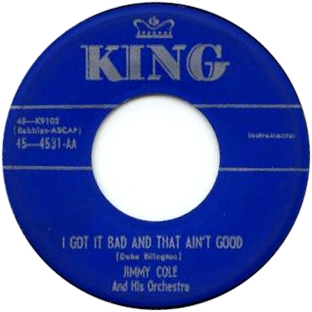
Thanks to Dieter Hartmann for pointing out the Garvin reissue on a Sing LP, and the French Vogue single that reissued King 4531. On the Vogue, the band is also identified as Jimmy Cole and his Orchestra.
"Outside" is a ballad with an alto sax intro by Jimmy Coe, and some prominent obbligati behind Flo Garvin's vocal. There are no other solos. "Warm" is a blues with prominent baritone sax in the intro. Coe has a short alto break after the first vocal chorus and a nice solo between the second and third vocal choruses. Thanks to Dave Penny for making dubs of these two numbers available.
Bob Eagle has supplied us with some background on Flo Garvin, whom he interviewed in 1988. She was born Flo Crawford in Indianapolis on January 15, 1927, and was still living there in 2002 (according to Jimmy Coe's recent interview). On piano, her main influences were Art Tatum and Duke Ellington. She was booked at the Cotton Club in Cincinnati with Jimmy Coe's band in 1952, and was so successful there that she landed a 5-year contract with the club. For many years she was married to Ralph R. Deakyne (1926 - 1996), also of Indianapolis. During much of her career she worked as a single, or in a duo with bassist Hilliard "Dewey" Duewson.
On the second single from this session, which consists of instrumentals, "I Got It Bad" is all Coe. He states the melody and takes a long solo in his best Hodges mode. "Cole Tater" is blues-based: Mitchell's plunger-muted trumpet is unusually prominent; there is also a solo by "Cole" and a shorter piano solo by Stash O'Laughlin. Thanks to Dieter Hartmann for dubs of these two sides.
One Jimmy Cox is credited with vocals on this session in existing discographies. But he has proven to be a phantom; there is no sign of him anywhere.
While under contract to King, Jimmy Coe also cut a session for his old leader Tiny Bradshaw.
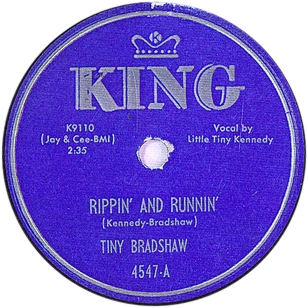
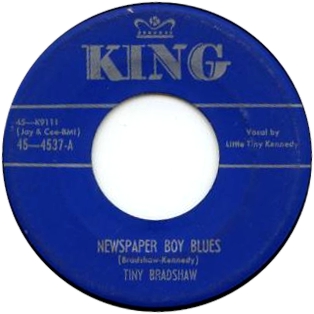
Tiny Bradshaw (voc, ldr); Leslie Ayres (tp); Jimmy "Cole" (as); Rufus Gore (ts); Alexander Nelson (bars); Jimmy Robinson (p); Will Gaddy (eg); Clarence Mack (b); Calvin "Eagle Eyes" Shields (d); Little Tiny Kennedy (voc).
King Studios, Cincinnati, February 27, 1952
| K9110 | Rippin' and Runnin' (Kennedy-Bradshaw) [LTK voc] | King 4547-A, Charly [F] 43 [CD], Westside [Br] WESA 824 [CD] | |
| K9111 | Newspaper Boy Blues (Bradshaw-Kennedy) [LTK voc] | King 4537-A, Krazy Kat KK7419, Charly [F] 43 [CD] | |
| K9112 | Mailman's Sack (Bradshaw-Glover-Mann) [TB voc] | King 4537-AA, Krazy Kat KK7419, Charly [F] 43 [CD], Westside [Br] WESA 824 [CD] | |
| K9113 | Lay It on the Line (Bradshaw-Glover-Mann) [TB voc] | King 4547-AA, Jukebox Lil JR621, Westside [Br] WESA 824 [CD] |
Our basic session information comes from Lord, who, following King's publicity department of the period, refers to Jimmy "Cole." The Charly CD and the Jukebox Lil LP were Tiny Bradshaw collections, titles unknown. According to Dave Penny, who corrected the vocal credits for K9110, Westside WESA 824 is a British CD, released in January 1999 under the title Tiny Bradshaw: Walk That Mess! The Best of the King Years.
K9110 and 9111 feature a falsetto singer pretending (not in the most convincing possible manner) to be female and a bass singer engaged in vaudevillian dialogue. As "Little" Tiny Kennedy was a female impersonator, it appears that he contributed both sides of the dialogue. (See the vocal credits to "Little Tiny Kennedy" on the labels.) Thanks to Dave Penny for sorting out these "duets" for us.<.p>
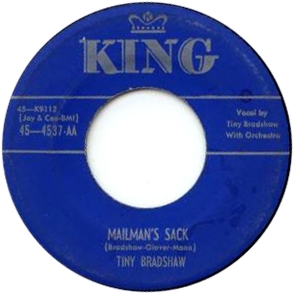
The two "dialogue" numbers leave no room for instrumental solos. "Mailman's Sack" features a tenor sax solo by Rufus Gore. "Lay It on the Line" has a long solo by Jimmy Coe; we concur with Dave Penny's judgment that this is "splendid alto work." Coe's solo is followed by another tenor outing by Gore.
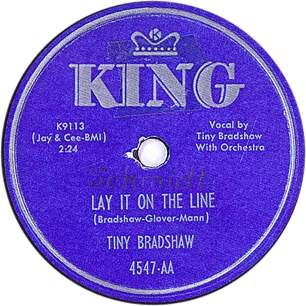

Coe's relationship with King did not continue beyond these two sessions, however. In his interview with Dan Kochakian, he recalled:
About a year later, I went back to King. Their A&R man, who was also a musician, was in New York and Syd Nathan, the owner, was someplace else and I asked if I'm free to record with somebody else. The straw boss said yes. I said, 'Well, put it in writing.' I had taken 'After Hour Joint' to King for them to hear and they didn't have time to listen to it, so they gave me a release. Two days later, I was in Chicago and walked into States and gave it to Lew Simpkins or Leonard Allen. I played it and he said, 'Play that again.' I played it again and he said, 'When can you come and record?' I had it on a tape recorder that you had to rewind by hand. That was the drummer, Earl Walker, who was doing the talking. States laid that name on me. They named my group The Gay Cats of Rhythm. We also cut 'Run Jody Run.' Jody's like an Army guy who's hanging out at the girl's house and he has to run. 'Fast Blues' [oriingally "The Jet"] was put into the movie, Going All The Way, a couple of years ago. I made a new copyright on it, so it's mine.
During this period, Coe's band was working George's Bar on Indiana Avenue in Naptown. When George's closed at 12 midnight, the band members made their way to an upstairs after-hours joint called the Royal Roost, whose, er, varied clientele is immortalized in "After Hours Joint" and "Raid on the After Hours Joint." Coe seems to have played tenor sax at George's—at least that is what we hear on the two sessions he got to make for States. Some of these recordings are novelty R&B, with comic dialogue by Coe, drummer Earl "Fox" Walker, and other members of the band. But the same superior musicianship is on display, whether the band is doing "Raid on the After Hours Joint" or "How Deep Is the Ocean."
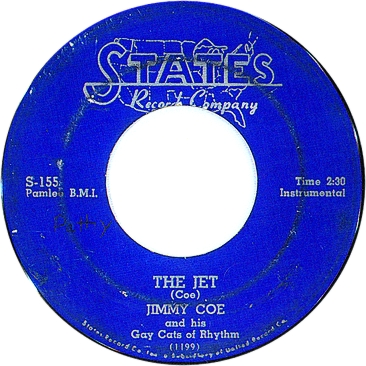
Jimmy Coe (ts, voc); James Palmer (p -1, org -2); John Wittcliffe (b); Earl "Fox" Walker (d, talk); Helen Fox (voc); Max Bailey (voc).
Universal Recording, Chicago, February 1, 1953
| 1195-8 | After Hour [sic] Joint (Coe-Walker-Palmer-Wittcliffe) [FW, ens talk] -1 | States 118, P-Vine [J] PLP-9037, Delmark DL-438, Delmark DL-443, Delmark DD-438 [CD] | |
| 1196 | Run Jody Run (Coe-Bailey) [MB, ens voc] -2 | States 155, Delmark DL-443, Blue Moon BMCD 6010, United U-163 [CD] | |
| 1197 | Baby I'm Gone ("Cole") [HF, MB, ens voc; FW talk] -1 | States 118, Delmark DL-443 | |
| 1198 | What Will I Tell My Heart? -2 | Delmark DL-443 | |
| 1199-2 | The Jet [Fast Blues*] (Coe) -2 | States 155, P-Vine [J] PLP-9037*, Delmark DL-438*, Delmark DL-443*, Delmark DD-438 [CD]* |
Tom Lord lists this session in his Jazz Discography, but omits all vocal credits. The liners to Delmark DL-443 give vocal credits but do not specify session or matrix number. Bob Koester's 1977 discography of United and States gives date, title, and matrix number. Lord neglects to mention that "Baby I'm Gone" originally appeared on States 118 (he mentions "Come Back Baby," an unused title in the company files for the same piece). Nobody at Delmark seems to have realized that 1199 was issued as "The Jet"; it appears on reissues merely as "Fast Blues."
Lord places "How Deep Is the Ocean?" at the end of this session, but the audible rhythm guitar shows that it came from the next one instead, and Coe confirmed that in his interview with Dan Kochakian. Lord lists a take of "Empty Bed" from this session, but there is no reason to suspect one ("Empty Bed" on Delmark DL-443 has a rhythm guitar and is therefore also from the next session.)
Delmark DD-438 was a CD collection titled Honkers & Bar Walkers Volume 1; it was a reissue of the 1988 LP collection on Delmark DL-438. (Coe's comment on this title: "I have never honked, but I have walked the bar.") Items recorded for DeLuxe and Regal were also included in the LP and the CD. P-Vine PLP-9037, Sax Blowers & Honkers, is a Japanese LP released in 1982. The first commercial reissue of anything from Jimmy Coe's sessions for States, it is the precursor to Delmark DL-438, which has 16 tracks on it where the P-Vine had 14. Apparently no one in Japan has heard of walking the bar...
Delmark DL-443 was a Jimmy Coe LP titled After Hours Joint; it was released in 1989. Lord gives the number incorrectly as DL-433, actually the second LP in a double album by the Art Ensemble of Chicago.
"Run Jody Run" can also be had on Blue Moon BMCD 6010, Obscure Blues Shouters Volume 1, a various-artists collection that was released in Spain in 1996. "Run Jody Run" is included under the name of Max "Blues" Bailey. United U-163 is a bootleg CD issued in 1999 under the title Rare Windy City R&B Vocal Groups From the street-corners of Chicago Volume One.
The big gap in matrix numbers between this session and the next one is semi-illusory. Koester's discography of the United and States labels shows how Universal assigned matrix numbers 1200-1246 to sessions for the States label cut between June 4 and November 26, 1952—before Universal got around to using 1195-1199.

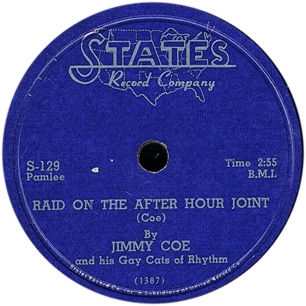
Jimmy Coe (ts, voc); James Palmer (p -1, org -2); Remo Biondi (g -3; vln -4); John Wittcliffe (b); Earl "Fox" Walker (d, talk); Helen Fox (voc); Leonard Allen (speech -5).
Universal Recording, Chicago, October 17, 1953
| 1384-5 | Organ Grinder [FW shout] -1, 2 | Delmark DL-443, Delmark DD-775 | |
| 1385 | Empty Bed [HF voc] -1, 2, 3 | Delmark DL-443 | |
| 1386 | He's Alright with Me (Fox) [HF, ens voc] -1, 3 | States 129, Delmark DL-443 | |
| 1387 | Raid on the After Hour [sic] Joint (Coe) [LA, FW, JC, ens dialog] -1, 3, 5 | States 129, Delmark DL-443 | |
| A Fool Was I [HF voc] -1, 3 | Delmark DL-443, Delmark DE-554 [CD] | ||
| How Deep Is the Ocean [HF voc] - 1, 3 | Delmark DL-443, Delmark DE-554 [CD] | ||
| Lady Take Two -1, 3, 4 | Delmark DL-443 |
States 129 was a 78- and 45-rpm single released around December 1953. Delmark DL-443 was a Jimmy Coe LP titled After Hours Joint; it was released in 1989. Delmark DE-455, Yes Indeed! Women Vocalists on United, is a various-artists CD collection issued in 2004. Helen Fox joins Della Reese, Bixie Crawford, Debbie Andrews, Helen Thompson, Terry Timmons, and Jewel Belle, who recorded for United or States, and Betty Mays and Vanita Smythe, who recorded for Regal. Delmark DD-775, The United Records Story, is a various-artists collection released in 2004.
Tom Lord gives session info in his Jazz Discography, but neglects to credit Leonard Allen (owner of the United and States labels) for his cameo appearance as a policeman, and cites Remo Biondi as a vocalist on "Lady Take Two" instead of a violinist. Lord fails to place "How Deep Is the Ocean" on this session and is ambivalent about the provenance of "Empty Bed." Koester's 1977 discography of United and States lists only the titles that were given master numbers, and uses file titles instead of those that actually appeared on the labels (so 1387 comes out as "Before Closing").
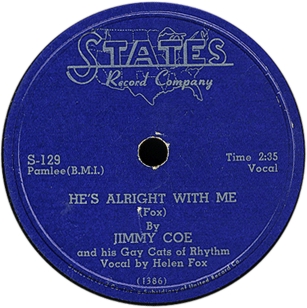
The liners to Delmark DL-443 credit Allen with his cameo and mention Biondi's violin solo on "Lady Take Two," but fail to note that he switches back to rhythm guitar after a brief pizzicato accompaniment to the beginning of Coe's solo. DL-443 credits Biondi with rhythm guitar on "Raid" but fails to mention that he is actually on every number from this session except the first one, "Organ Grinder" (old-fashioned rhythm guitar throughout, no solos). And Delmark DE-554 places both "A Fool Was I" and "How Deep Is the Ocean" on the February 1 session, despite the prominent rhythhm guitar on both. Biondi was famous for dropping in on United/States sessions (he recorded with Roosevelt Sykes and Johnny Wicks, among others)--where he was always welcome, because he could play with anyone and contributed his services for free. He must have arrived shortly after this one began.
"Raid," besides Biondi's guitar and Leonard Allen's cameo, also includes spoken remarks by other band members, and sound effects including a siren and a paddy wagon idling. "Lady Take Two" is actually "Lady Be Good." The label of Delmark DL-443 has it as "Lady Take Three"!
On occasion, James Palmer played organ with one hand and piano with the other, as he does on "Organ Grinder."
Perhaps Leonard Allen was disappointed with "Raid on the After Hour Joint"; in any event, his company's fortunes began a slow decline in 1954 and Jimmy Coe was not invited back to Chicago to record. Jimmy and his wife, Delores V. Coe, were married on July 29, 1957. Their children include Michelle, born around 1962, Earl, who was born around 1965, and Jimmy Jr.
Around the beginning of 1958, Jimmy Coe began an association with Note Records, an Indianapolis-based outfit with a branch in Cincinnati. Note was run by Jerry and Mel Herman, who were also the proprietors of Whirling Disc Record Distributors. (Note had been active since 1954, producing as many as 9 releases through 1957, but to our knowledge Coe had no connection with the label then.) We previously listed two sessions with The Students; in his interview with Dan Kochakian, Coe mentions further sessions for Note backing The Five Stars and Ronny Haig.
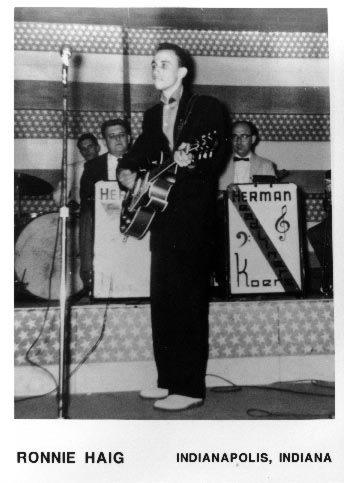
Ronnie Haig was born Ronald D. Hege in Indianapolis on March 21, 1939. A white rock and roller, he had never worked with a black band before cutting his first session for Note.
Here are his recollections of recording with Jimmy Coe (from an email to Armin Büttner, August 1, 2002). Haig recalls making as 5 or 6 sessions with Jimmy Coe for Note (all of them at the Chess Studios).
First, Jimmy Coe is one of the finest musicians I have ever known. He has never been given the attention he deserves. When we first met, we were getting ready to do a session (my first) at Chess Studios in Chicago. Jimmy and his band were wonderful.
How they adapted to rock and roll was awesome, being jazz musicians. Everybody was paid 50 bucks to do the thing. "The Five Stars" and myself were to split a 6 hour log of time doing 4 songs. They did: "Pickin' on the wrong chicken" b/w "Dreamin'" and I did "Don't you hear me calling baby" b/w "Traveler of love." The musicians were: Jimmy Coe and Pooky Johnson on the saxes, Will Scott on stand up bass, Earl "Fox" Walker (from Lionel Hampton's band) on drums, and I believe Henry Cain on Grand Piano.
Wes Montgomery and I played guitars. I did my own lead work. Jerry and brother Mel Herman along with Sy Bagal owned "Note" Records here in Indianapolis, In. We did the session with me playing on the Five Stars stuff, and them doing the back-up on mine.
On Mothers Day in May, we went back to Chicago this time just me and Coe's band, to do #2 "Rocking with Rhythm and Blues" b/w "Money is a thing of the Past" for Note.
In the meantime my first recording was picked up by ABC Paramount out of New York for national (international) distribution.
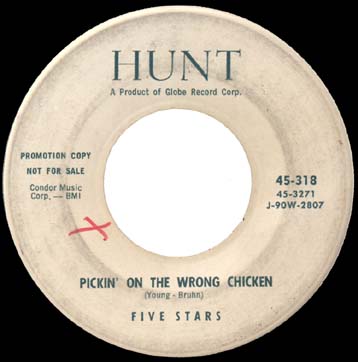
Ronny Haig (voc on ^, eg); The Five Stars: Jim Bruhn, Bill Campbell, Larry Hoffman, Bruce Miller, Ron Russell (group voc on *, bg voc on ^); Jimmy Coe (ts, bars, ldr); Pookie Johnson (ts); Henry Cain (p); Wes Montgomery (eg); Will Scott (b); Earl "Fox" Walker (d).
Chess Studios, Chicago, February 18, 1958
| J9OW-2807, 3272 | Pickin' on the Wrong Chicken (Young-Bruhn)* | Note 10011, Hunt 318, ABC Paramount 45-9911 | |
| J9OW-2808, 3271 | Dreaming (Russell-Clark)* | Note 10011, Hunt 318, ABC Paramount 45-9911 | |
| J9OW-2809, AMP 45-3274 | Don't You Hear Me Calling, Baby (R. Hege)^ | Note 10010, ABC Paramount 45-9912, ABC Paramount 45-10209, Esoldun LP 2024 | |
| J9OW-2810, AMP 45-3273 | Traveler of Love (R. Hege)^ | Note 10010, ABC Paramount 45-9912, ABC Paramount 45-10209 |
Note 10010 and 10011 were 45-rpm singles released in March 1958. The RCA-derived J9OW series matrix numbers appear on the Note releases; the 3270 series numbers appeared on the Hunt release (no AMP prefix) and on the ABC Paramounts (which also carry the J9OWs with different punctuation). The recording location and date and the band personnel are from Ronnie Haig (email to Armin Büttner, August 1, 2002). The matrix numbers and the ABC Paramount release for the Five Stars are from Robert Ferlingere, A Discography of Rhythm & Blues and Rock 'n Roll Vocal Groups 1945 to 1965.
The release dates and information about LP reissues are from Terry Gordon's Rockin' Country Style Web site, http://rcs.law.emory.edu/rcs/index.htm. Gordon gives the release date of ABC Paramount 45-9912 as early April 1958; it was reviewed in Cash Box on April 12 (p. 14). The reissue on ABC 45-10209 came out in May 1961. Esoldun LP 2024 was a compilation titled Hot Boppin Cats.
According to Jimmy Coe, he was responsible for all of the lead sax work and all of the saxophone solos on the Note sessions. He also had this to say about the Five Stars:
The Hermans also had The 5 Stars who appeared on American Bandstand after they had a hit record. Mel started asking for too much money for concerts for the group and that killed the record because nobody wanted to pay the high prices. (Interview with Dan Kochakian, April 17, 2002)
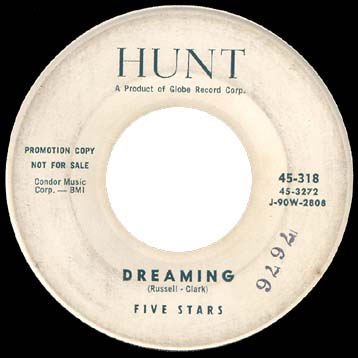
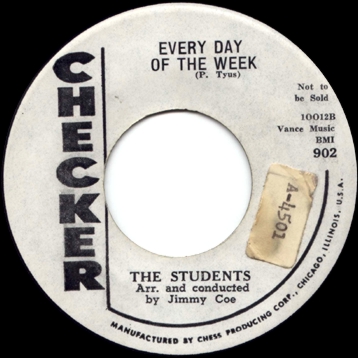
Ronnie Haig (eg, voc*); The Students: Leroy King (lead tenor), Richard Johnson, John Bolden, Roy Ford, Dorsey Porter (voc %); accompanied by Jimmy Coe and The Cohorts: Jimmy Coe (ldr; ts, bars except -1, 2); Pookie Johnson (ts except -1, 2); Henry Cain (p except -2); Wes Montgomery (eg); Will Scott (b); Earl "Fox" Walker (d).
Chess Studios, Chicago, May 11, 1958
| J9OW-4996 | Every Day of the Week (P. Tyus) % [S voc] -2 | Note 10012B, Checker 902, Argo 5386, Cadet 5386, Roots RTS 33021 [CD], Rhino R2 71462 [CD] | |
| J9OW-4997 | I'm So Young (P. Tyus) % [S voc] -1 | Note 10012A, Checker 902, Argo 5386, Cadet 5386, Roots RTS 33021 [CD], Rhino R2 71462 [CD] | |
| J9OW-4998 | Wazoo ^ ("C. G. Herman") [S bg voc] -1 | Note 10013A | |
| J9OW-4999 | Shuffle Stroll ^ (Coe) | Note 10013B | |
| J9OW-5000 | Rockin' with Rhythm & Blues (R. Hege)* | Note 10014A, Eagle LP 305, Esoldun LP 2003, Lost Gold CD 5898, Mr. DJ CD 101, Spin CD 1001, Wendi LP 000012, Yeaah! CD 13 | |
| J9OW-5001 | Money Is a Thing of the Past (R. Hege)* | Note 10014B, Eagle LP 304, Lenox CD 1013, Wendi LP 000012 |
Many thanks to Marv Goldberg for bringing this session and the follow-up session with The Students to our attention. The Students were a vocal group out of Cincinnati (they are to be distinguished from several other groups called The Students, including one from Philadelphia that recorded on Red Top). After Chess signed The Students, they were sent to Indianapolis to rehearse with the Jimmy Coe group; the recording session took place at the Chess Studios in Chicago. Chess made a deal with Note Records of Indianapolis, whereby the records were released locally by Note (in Indiana and Ohio) and elsewhere by Checker. The tunes were assigned to Note's house publishing company, not to Arc Music.
Ronnie Haig (email to Armin Büttner, August 1, 2002) recalls that this session took place on Mothers' Day, 1958. He also recalls the instrumentals and the two sides by The Students, which the RCA-derived matrix numbers suggest were done on the same occasion.
Date, titles, and original matrix numbers for the Students and the Jimmy Coe items (which indicate that RCA pressed Note's records) from Goldberg. We obtained information from Robert Ferlingere's Discography of Rhythm & Blues and Rock 'n Roll Vocal Groups, Volume 2(2nd ed., 1992). (Ferlingere's personnel for The Students is incorrect, although the "P. Tyus" he lists did write some of the group's songs.) Ferlingere says that Checker 902 was released in August 1958; the Note release was probably a little earlier. Argo 5386 appeared in March 1961. The Chess brothers must have expected durable demand for the record; 1965, after they changed names on the Argo label, they reissued 5386 on Cadet. According to Ferlingere, the Checker and Argo releases altered the matrix numbers to U4996 and U4997. "I'm So Young" was the A side on all of these singles. Roots RTS 33021, Roots of Doo Wop, is a CD released in the 1990s.
Jimmy Coe's band got to do two instrumental numbers, which were released only on Note. The band was identified as Jimmy Coe and The Cohorts. In his interview with Dan Kochakian, Jimmy Coe noted that he borrowed Bill Boyd's baritone sax and played it on "Wazoo!!" C. G. Herman and Mel Herman owned Note Records; Mel was also the manager of The Students. "Wazoo" had backing vocals from The Students.
Ronnie Haig (email to Armin Büttner, August 2, 2002) has a few comments about "Wazoo":
Jimmy and I worked together on an instrumental 45. Jerry Herman took credit for the writing but it was Jimmy and I . Wrote it on the spot. Ask him! "Wazoo!" b/w "Shuffle Stroll" You'd love it. The "Wazoo" thing had one word in it. WAZOO! yelled by the "Students."
"Shuffle Stroll" was a pure instrumental. The release date for Note 10013 was presumably June or July 1958.
In an interview with Goldberg, Dorsey Porter recalled only one member of the Coe band—Wes Montgomery! However, on the two sides by The Students, another guitar—which we thought was Ralph Byrd (who toured with the group)—is more prominent. On the other hand Ronnie Haig remembers being on the session but doesn't mention Ralph Byrd. To be resolved, or so we can hope.
Note 10014 was a single released around July of 1958. The LP and CD reissues for this Ronnie Haig single are are listed on Terry Gordon's Rockin' Country Style Web site, http://rcs.law.emory.edu/rcs/index.htm. Eagle LP 305 was a compilation titled Boppin Guitars; Esoldun LP 2003 was Rockabilly Bop, Vol. 2; Lost Gold CD 5898 was a compilation of Original Historic Rockabilly Classics, Vol. 2; Mr. DJ CD 101 went as Cruisin' Classics, Vol. 1; Spin CD 1001 was titled $15,000 Worth of Rockabilly, Vol. 2; Wendi LP 000012 was Dig that Rock & Roll from Indiana; and Yeaah! CD 13 was a collection of Rockabilly Rarities, Vol. 2; Eagle LP 304 was Stack-a-Records, Vol. II; Lenox CD 1013 was 50's Rockers, Vol. 2.
The Five Stars: Jim Bruhn, Bill Campbell, Larry Hoffman, Bruce Miller, Ron Russell (voc); Jimmy Coe (ts, bars, ldr); Pookie Johnson (ts); Henry Cain (p); Ronnie Haig (eg); Will Scott (b); Earl "Fox" Walker (d).
prob. Chess Studios, Chicago, c. July 1958
| J8OW-6092 | My Paradise (McDaniels-Nunn) | Note 10016 A | |
| J8OW-6093 | Friction (Ronnie Clark) | Note 10016 B, Wendi LP 000012 |
Ferlingere lists this as a 1958 release. According to Terry Gordon's Rockin' Country Style Web site, http://rcs.law.emory.edu/rcs/index.htm, the tunes got their BMI clearance in July 1958. Wendi LP 000012 was Dig that Rock & Roll from Indiana. We got the composer credits and confirmed the matrix numbers from a copy of Note 10016 in the collection of Dan Kochakian.
Ronnie Haig has stated that he played guitar on the Jerry Seifert session (see below); that almost certainly puts him on this one as well.
The sides with matrix numbers J8OW-6094 and 6095 are unaccounted for. Could these also have been by the Five Stars?
Jerry Siefert (voc); JJimmy Coe (ts, bars, ldr); Pookie Johnson (ts); Henry Cain (p); Ronnie Haig (eg); Will Scott (b); Earl "Fox" Walker (d).
Chess Studios, Chicago, c. July 1958
| J8OW-6096 | Dirty White Bucks (and Tight Pegged Pants) (R. Hege) | Note 10018 A, Buffalo Bop CD 55018, Wendi LP 000012 | |
| J8OW-6097 | Never Baby Never (R. Hege) | Note 10018 B, Buffalo Bop CD 55018, Wendi LP 000012 |
These are almost certainly from the same session as the previous entry. According to Terry Gordon's Rockin' Country Style Web site, http://rcs.law.emory.edu/rcs/index.htm, the tunes got their BMI clearance in July 1958. Wendi LP 000012 was Dig that Rock & Roll from Indiana. Buffalo Bop CD 55018 was a compilation titled High School Caesar.
Ronnie Haig comments:
Jerry Seifert was brought to me by Jerry Herman. He asked me to take him under my wing so to speak. Took him on several of my shows and eventually he wound up at Chess with us doing two of my songs: "Dirty White Bucks" b/w "Never Baby Never" for Note. (email to Armin Büttner, August 1, 2002)
Haig is still active in music; some years ago he released a CD titled Still Kickin' Butt on the Radioactive Gold label.
Ronnie Haig does not appear to have been involved with the remaining Jimmy Coe sessions for Note.
The Students: Leroy King (lead tenor), Richard Johnson, John Bolden, Roy Ford, Dorsey Porter (voc); accompanied by Jimmy Coe and Orchestra: Jimmy Coe (ts, ldr); Henry Cain (p); prob. Ralph Byrd (eg); Will Scott (b); Earl "Fox" Walker (d).
Chess Studios, Chicago, prob. early 1959
| K8OW-0882 (11361) |
My Vow to You (Students) | Note 10019, Checker 1004 | |
| K8OW-0881 (11362) |
That's How I Feel (Students) | Note 10019, Checker 1004 |
Our information about this session comes from Marv Goldberg. He places it "several months" after the Students' first one. Note 10019 was released in early 1959. Checker 1004 did not appear till January 1962, according to Ferlingere, which means it waited till Note had gone out of business.
The matrix numbers in parentheses are in the U7000 series and derive from the Checker single; obviously they were attached to the record when the Chess brothers finally released. We have recently been able to retrieve the original matrix numbers from the Indiana records site, http://45rpmrecords.com/IN/pop/K8OW-0882.php and http://45rpmrecords.com/IN/pop/K8OW-0881.php.
According to Ferlingere, "That's How I Feel" was the A side; Note 10019 did not designate A and B sides, so this apparently just refers to the order of the matrix numbers. Ferlingere says that Leroy King sang the high tenor lead on "My Vow to You." According to Dorsey Porter, Wes Montgomery did not play on this session. A listen to "My Vow to You" indicates one tenor sax (no solos), piano, guitar, bass, and drums. The guitarist doesn't sound like Ronnie Haig, either.
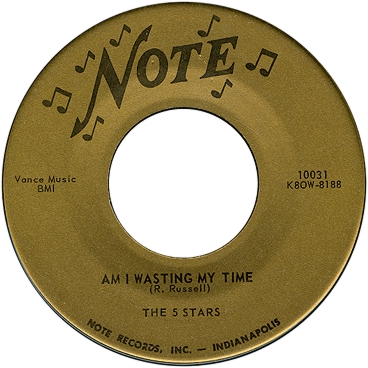
The Five Stars: Jim Bruhn, Bill Campbell, Larry Hoffman, Bruce Miller, Ron Russell (voc); prob. Jimmy Coe (arr, cond); unidentified (eg); Henry Cain (p); Will Scott (b); Earl "Fox" Walker (d).
prob. Chess Studios, Chicago, 1959
| K8OW-8187 | Gambling Man (R. Allbright) | Note 10031 | |
| K8OW-8188 | Am I Wasting My Time (R. Russell) | Note 10031 |
Note 10031, apparently a 1960 release, probably inolves Jimmy Coe's last session work for the label. The matrix numbers indicate a 1959 recording. According to Bob McGrath, The R&B Indies (West Vancouver, BC: Eyeball Productions, 2000), 10031 was the very last release on the Note label.
Coe is not heard on either side of Note 10031, but the rhythm section sounds like the one on "My Vow to You" from the previous session, so we are crediting him with a role here. Of course we don't know whether further sides were cut on this occasion.
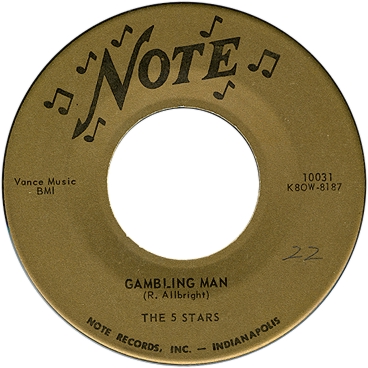
I was the house band for Joe Mitchell's brother, Tuffy Mitchell, who owned the Pink Poodle that was about three blocks down and around the corner from the Mitchell Inn on Capital Avenue in Indianapolis. The band was organ, bass and sax. Sometimes I used organ and piano. I was there for about three years and everybody came in there! Jimmy Smith, Ruth Brown, Moms Mabley, Redd Foxx, Dakota Staton, Roy Hamilton, Pigmeat Markham, George Kirby, Slappy White and Aretha Franklin when she wasn't even 21. We had to get a chaperone for her. (Interview with Dan Kochakian, April 17, 2002)
We'd thought that the Note/Checker efforts exhausted Jimmy Coe's involvement with rock and roll, at least in the studio. But in 1959 his group was tapped for a session with one Jimmy Ganzberg, another rockabilly performer who played piano. The leader's full name was James Leroy Ganzberg and he was born in Indianapolis around 1940. The session led to two singles on for a company called Jet, which we presume had no distribution outside of Indiana. Jimmy Coe is named on the labels. The K series numbers from RCA Victor Custom Pressing indicate the year.
Jimmy Ganzberg (p, voc); Jimmy Coe (ts); prob. Pookie Johnson (ts); Jimmy Lee Williams (eg); other musicians unidentified.
Location unknown, 1959
| K8OW-5434 | Hang-Out (Williams)* | Jet 816J-5434A, Wendi LP 000012 | |
| K8OW-5435 | White Saddle Shoes (Ganzberg)* | Jet 816J-5434B, Wendi LP 000012 | |
| K8OW-5436 Jo-Ellen (Ganzberg)* | Jet 816J-5436A | ||
| K8OW-5437 | Ring & Wedding Veil (Ganzberg) | Jet 816J-5436B |
Ganzberg played the piano, as noted on the labels, and brought his own guitarist, one Jimmy Lee Williams, who is featured on the instrumenal side, "Hang-Out." On three of the four sides (we haven't heard "Ring & Wedding Veil"), two tenor saxes are in the ensembles but it's pretty clear that all solos are Jimmy Coe's. By this time, Coe knew exactly what to do on on a rock and roll record. Judging from the somewhat imprecise recording balances and the piano that hadn't been freshly trucked in from the Steinway warehouse, we figure the recording could have been done in Indianapolis, but we have no real idea of the venue. The two Jet 45s were released in 1959. Ganzberg made a third 45 for Jet, but it was with a different band.
Wendi LP 000012 was titled Dig that Rock & Roll from Indiana. It spells the pianist's name "Gazberg" and doesn't mention Jimm Coe's involvement—otherwise, we'd have included this entry years ago.
Jimmy Coe spent many years teaching music in the Indianapolis public schools, during which time he remained attentive to changes in jazz and R&B and continued to play on the side. He began working with his 17-piece big band around 1965. The group played behind such performers as Betty Fields, Aretha Franklin, Roy Hamilton, Al Hibbler, George Kirby, Gladys Knight & the Pips, Carol Landis, Moms Mabley, and Rowan and Martin.
Coe also became, for a brief time, his own indie label entrepreneur. There is a soul-jazz single that Coe produced himself and put out on a label called Intro. Our thanks to Yves François Smierciak for bringing this rare 45 to our attention and for donating a copy. In his 2002 interview with Dan Kochakian, Coe dates his Intro efforts to 1966. The instrumental 45 had two label mates, featuring vocals by Blues Palmer and Stefan Ross.

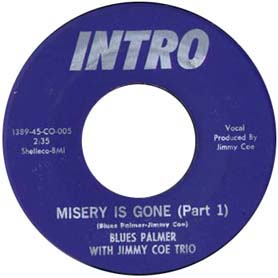
Jimmy Coe (ts); Al Walton (org); Henry Gooch (eg); Clem Tiggs (d); Blues Palmer (voc); Stefan Ross (voc)
Indianapolis, 1966
| 1276-45-002-A | Cold Jam for Breakfast (Coe)* | Intro CO-002 | |
| 1276-45-002-B | French Fried (Coe)* | Intro CO-002 | |
| 1389-45-CO-005 | Misery Is Gone (Part 1) (Palmer-Coe) [BP voc]*^ | Intro CO-005/006 | |
| 1389-45-CO-006 | Misery Is Gone (Part 2) (Palmer-Coe) [BP voc]^ | Intro CO-005/006 | |
| Please Be My Love [SR voc] | Intro # | ||
| Haste Makes Waste [SR voc] | Intro # |
CO-002, a self-produced 45-rpm single, was released in 1966; Jimmy Coe provided the date in his interview with Dan Kochakian, and gave the instrumental personnel. CO-002 consists of two soul-jazz instrumentals, both featuring solos by Jimmy Coe.
A second Intro single, from the same year, carries the dual numbering CO-005/006 (actually, only the matrix number appears on each side, but since there was a CO-002...). "Misery Is Gone" is super fast funk. There is a short tenor solo on Part 1, introduced by Blues Palmer's repeated shout: "Jimmy, blow me your horn!". The flip side has solos by organ and guitar. According to Jimmy Coe, Blues Palmer (a singer who appears to us to be under the influence of James Brown) is not related to his old buddy James Palmer.
Barney Quick was given a copy of the third Intro single by Jimmy Coe himself. It features singer Stefan Ross; details remain to be added.

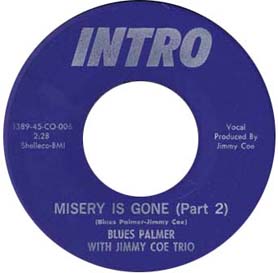
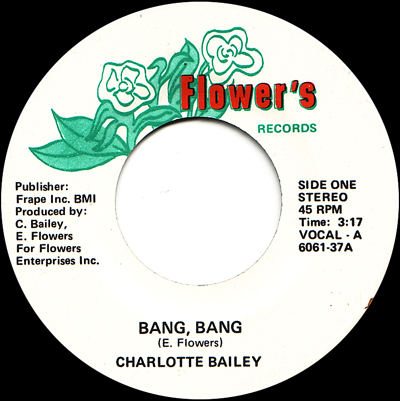
Jimmy Coe (ts, dir); Charlotte Bailey (voc on *); other musicians unidentified.
Indianapolis, 1976
| 6061-37A | Bang, Bang (E. Flowers)* | Flower's 6061-37 | |
| 6061-37B | Bang, Bang (E. Flowers) | Flower's 6061-37 |
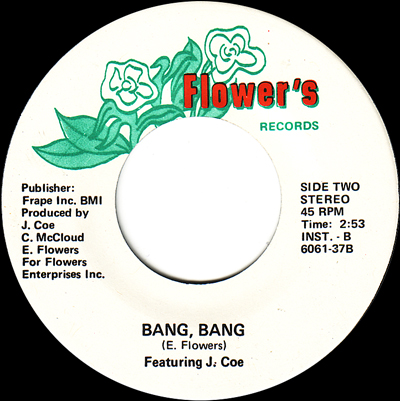
From around 1972 to at least 1982, Jimmy Coe held a day job as a buyer in the Central Purchasing department of the City of Indianapolis. According to his obituary, at other times he worked for the Marion County juvenile court, and the U. S. Post Office. On March 19, 1982 Jimmy Coe's orchestra backed Reverend James Cleveland at Indianapolis in a Gospel concert. Coe was booked to appear with The Indianapolis All Stars in New York and New Jersey during April 1982. (All of this information, except the other jobs that Coe worked, derives from Bob Eagle's 1982 interview with Jimmy Coe.)
A decade had passed since the Flower's single, and it appeared that Jimmy Coe might never get recorded again. But after he retired, he rededicated himelf to music. In 1987, he laid down some live tracks with a combo, and in the new decade he got a chance to cut a CD with his big band.
Jimmy Coe (ts -1, as -2, ldr); Pharez Whitted (tp -2); David Young (ts -2); Melvin Rhyne (p); Frank Smith (b); Killer Ray Appleton (d).
Circle Theater, Indianapolis, October 1987
| Here's That Rainy Day * (Burke-van Heusen) -1 | Time 011 [CD] | ||
| Now's the Time * (Parker) -2 | Time 011 [CD] |
These two small-group tracks from a live concert were included in Time Records 011, Say What?!, released on CD in 1994; also on cassette as Time TRIP011. Information from the liner notes. Coe is not credited with playing tenor sax on "Rainy Day" but it is obviously his feature. He solos on alto sax on "Now's the Time," and can be heard making announcements.
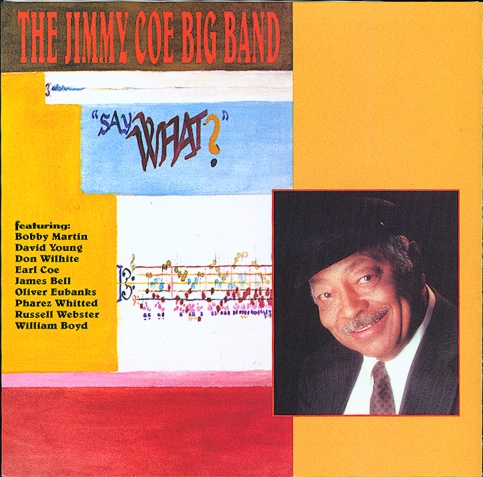
Jimmy Coe (as, ldr, arr); Pharez Whitted (tp); Lenny Foy (tp); Grant Manhart (tp); William "Whitey" Harris (tp); Mark Cravens (tb); Betty Lucas (tb); Reginald Du Valle (tb); Jim Hicks (tb); Alonzo "Pookie" Johnson (as); Russell Webster (ts); David Young (ts); William Boyd (bars); Don Wilhite (p); Oliver Eubanks (eg); Ratzo B. Harris (standup eb); Earl Coe (d); Bobby Martin (Latin perc); James Bell (voc).
TRC Studios, Indianapolis, 1993
| Say What?! Don't Even Try It! (Coe) | Time 011 [CD] | ||
| Portrait of Jenny (Young) | Time 011 [CD] | ||
| Third Bossa Nova (Webster) | Time 011 [CD] | ||
| Ceora (Morgan) | Time 011 [CD] | ||
| Someone to Watch over Me (Gershwin-Gershwin) | Time 011 [CD] | ||
| Reunion Riff (Webster) | Time 011 [CD] | ||
| The Very Thought of You (Noble) [JB voc] | Time 011 [CD] |
Say What? is a CD released in 1994 on the Time Records label. There is also a cassette version on Time TRIP 011. In the All Music Guide the label is called "Timeless." In some other sources it has been referred to as "On Time." Our information is drawn from the liner notes to the CD release. Harris is actually credited with playing a "Merdiant Vertical Bass."
The big-band tracks spotlight Jimmy Coe's arranging and lead alto playing. He does not solo on them. His old bandmate Bill Boyd plays the baritone sax; Earl Coe, the drummer, is Jimmy's son.
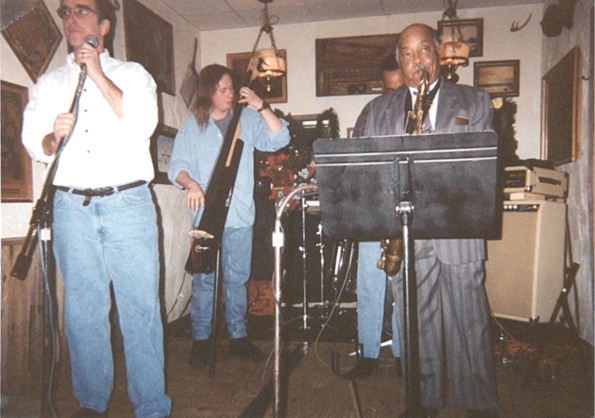
While Jimmy Coe did not record as prolifically in his 70s as Eddie Johnson, probably because of the sluggish pace of recording activity in Naptown, he made further sessions in 2000 and 2002. The first of these stemmed from his association with Paul Weeden, a guitarist who has established a presence in Europe, promoting older forms of jazz and R&B. (During his days in the Netherlands, Weeden toured with tenor saxophonist Tommy "Madman" Jones--see our Mad and M&M page for details.)
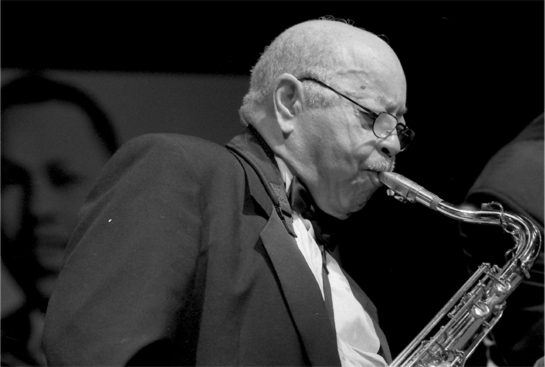
Jimmy Coe (ts); Paul Weeden (eg); Clifford Ratliff (tp, flg); Reginal Duvalle (tb); Emmett Stewart (bars); Melvin Rhyne (p); Frank Smith (b); Earl Coe (d); Steve Como King (perc); Ronald Weeden (voc); Aretta Bush (voc); James Bell (voc).
Indianapolis, April 21 and May 6, 2000
| Slick Dude | Weeden PWSR 1329 [CD] | ||
| At Odds | Weeden PWSR 1329 [CD] | ||
| Boogie Down | Weeden PWSR 1329 [CD] | ||
| This Bitter Earth [AB voc] | Weeden PWSR 1329 [CD] | ||
| Day by Day [AB voc] | Weeden PWSR 1329 [CD] | ||
| April Is Pretty | Weeden PWSR 1329 [CD] | ||
| Dexter | Weeden PWSR 1329 [CD] | ||
| In Between | Weeden PWSR 1329 [CD] | ||
| Now I Know | Weeden PWSR 1329 [CD] | ||
| More Today than Yesterday | Weeden PWSR 1329 [CD] | ||
| Naptown Shuffle | Weeden PWSR 1329 [CD] |
All details on this CD come from Frank Rubolino's review in Cadence (March 2001, pp. 45-46).
In 2000, Jimmy Coe also played on a repertory band CD under the direction of drummer and producer Jack Gilfoy.
Jack Gilfoy (d, ldr); Tommy Mullinix (tp, voc); Steve Robinett (tp, arr); Dan Hughey (tb); Bill James (cl, ts); Jimmy Coe (ts); Bob Lannerd (bass sax); Mike Lucas (p); Robin Hopkins (bj); Steve Dokken (b).
Indianapolis, 2000
| The Richmond Rag (Aufderheide) | Naptown Jazz Records # | ||
| My Gal Sal (Dresser) | Naptown Jazz Records # | ||
| Margie (J. R. Robinson) | Naptown Jazz Records # | ||
| Singin' the Blues (J. R. Robinson) | Naptown Jazz Records # | ||
| March of the Hoodlums (H. Carmichael) | Naptown Jazz Records # | ||
| I'm Gonna Stomp, Mr. Henry Lee (Condon) | Naptown Jazz Records # | ||
| You're Drivin' Me Crazy (Donaldson) / Moten Swing (Moten) | Naptown Jazz Records # | ||
| Georgia on My Mind (Carmichael-Gorrell) [TM voc] | Naptown Jazz Records # | ||
| Over and Over Again (W. DeParis) | Naptown Jazz Records # | ||
| Happy Feet (Yellen-Ager) | Naptown Jazz Records # | ||
| Judy (Carmichael-Lerner) | Naptown Jazz Records # | ||
| How High the Moon (Hamilton-Lewis) | Naptown Jazz Records # | ||
| Buster's Last Stand (G. Evans-C. Thornhill) | Naptown Jazz Records # |
All of our information about this CD came from Jack Gilfoy's Web site, http://www.jackgilfoy.com/jazzstate2.htm. The pianist was left off the personnel list there; our thanks to Mike Lucas for letting us know that he was on these sessions. We do not know the release number of the CD, which came out in 2000 on Gilfoy's own label, Naptown Jazz Records. And there may be vocals on other tunes besides "Georgia on My Mind"--Mullinix' statement happened to be included on an mp3 clip from the site.
When interviewed in April 2002, Jimmy Coe declared:
I've played steadily from the '60's and '70's through today. I teach saxophone and have 6 students. My two sons, Earl [drums] and Jimmy, Jr. [trumpet], play with me in my orchestra. I cut a Big Band CD for Delmark [actually for Time, but Delmark has distributed it] in 1993 and hardly a day goes by that I don't play my horn!
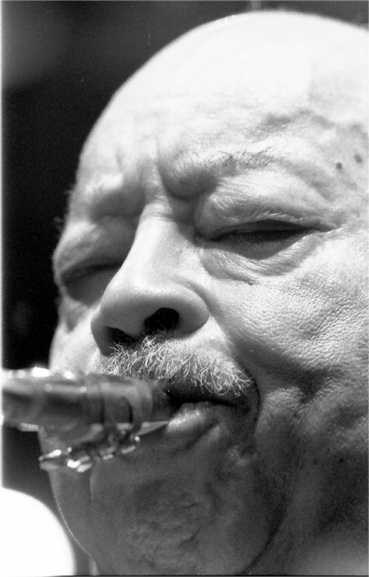
In 2002, Jimmy Coe embarked on his very first European tour. We'll let Dani Gugolz tell the story here:
In September, 2002 my friend Duke Seidmann and I organized the "Jumpin' at the Flagships" concerts in Switzerland, inviting, among the others mentioned below, JIMMY COE. It was HIS FIRST TIME EVER IN EUROPE, and he was accompanied by his lovely wife Dolores.......we had a ball!
The events with the concerts were set up by Duke Seidmann for the Ringier publishing company of Switzerland.
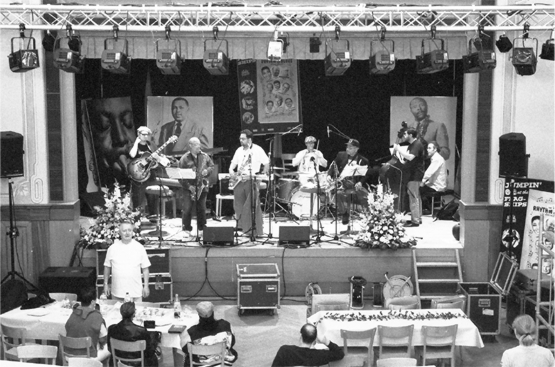
There are two compilations from this tour, which we will list separately to reduce confusion. The CD uses material from three different nights; the DVD contains only tracks recorded in Zürich on September 13.
Live on tour in Switzerland: September 12 (St. Prex), 13 (Zürich), and 14 (Locarno), 2002
Carrie Smith (voc on 9, 10, 12, 13, 14); James "Red" Holloway (ts on 3, 4, 7, 8, 11, 12, 13, 14; voc on 4, 6); Jimmy Coe (ts on 6, 7, 8, 11, 12, 13, 14); Duke Seidmann (ts 7, 8, 11, 12, 13, 14); Rusty Zinn (eg, voc on 2, 4, 6); Frank Muschalle (p on all except 7, 8, 11); Dave Ruosch (p on 5, 7, 8, 11, 12, 13, 14); Daniel Gugolz (b); Peter Müller (d)
| 1. Mutiny in the Fish House | Ringier private CD | ||
| 2. If You Ever Get Lonesome | Ringier private CD | ||
| 3. Foolin' Around Slowly | Ringier private CD | ||
| 4. I'd Rather Drink Muddy Water | Ringier private CD | ||
| 5. Sixth Avenue Express | Ringier private CD | ||
| 6. After Hours Joint | Ringier private CD | ||
| 7. Jumpin' at the Flagships | Ringier private CD | ||
| 8. Castle Rock | Ringier private CD | ||
| 9. Confessin' the Blues | Ringier private CD | ||
| 10. Trouble in Mind | Ringier private CD | ||
| 11. Strollin' with Bone | Ringier private CD | ||
| 12. Everyday I Have the Blues | Ringier private CD | ||
| 13. Jumpin' the Stormy Monday | Ringier private CD | ||
| 14. "Liggins on LSD" (The Honeydripper) | Ringier private CD |
The Ringier CD is a private recording, not for sale.
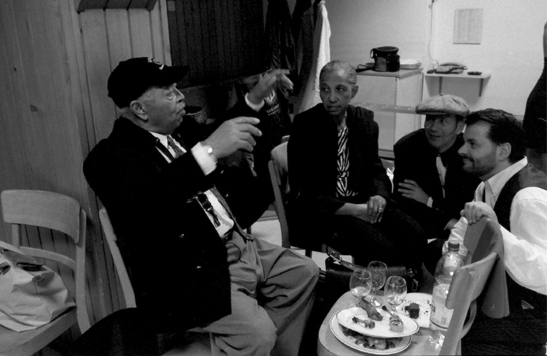
Live at Miller's Studio, Z&umml;rich, Switzerland, September 13, 2002
Carrie Smith (voc on 9, 10, 12, 13, 14); Red Holloway (ts and voc on 4, 6); Jimmy Coe (ts on 5, 6, 11, 12); Duke Seidmann (ts on 6, 10, 11, 12); Rusty Zinn (eg except 1, 5; voc on 3, 5); Frank Muschalle (p on all tracks except 6, 9, 10); Dave Ruosch (p on 2, 6, 8, 10, 11, 12); Daniel Gugolz (b); Peter Müller (d)
| 1. Mutiny in the Fish House | Ringier private DVD | ||
| 2. Sixth Avenue Express | Ringier private DVD | ||
| 3. Mother-in-law Blues | Ringier private DVD | ||
| 4. I'd Rather Drink Muddy Water | Ringier private DVD | ||
| 5. After Hours Joint | Ringier private DVD | ||
| 6. Smooth Sailing | Ringier private DVD | ||
| 7. Country Man | Ringier private DVD | ||
| 8. Confessin' the Blues | Ringier private DVD | ||
| 9. Mama, He Treats Your Daughter Mean | Ringier private DVD | ||
| 10. Nobody Knows You When You're Down and Out | Ringier private DVD | ||
| 11. Strollin' with Bone | Ringier private DVD | ||
| 12. Everyday I Have the Blues | Ringier private DVD |
According to Dani Gugolz, the concerts were promotional events for the company customers. The CD and DVD were pressed on a limited edition basis (3000 pieces), not for sale in stores.
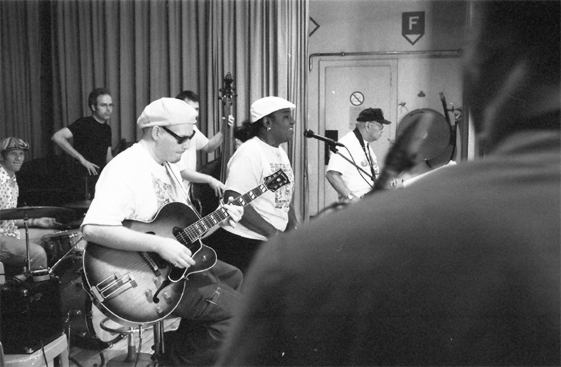
Jimmy Coe was credited with the arrangements for a big band on a 2003 CD release by Naptown singer/pianist Jimmy McDaniels on his own JMCA label. See http://www.cdbaby.com/cd/mcdaniels/from/evor for some information about the release. We will post a fuller listing (with instrumental personnel, we hope) eventually.
Jimmy Coe was listed as an arranger for one track on a CD released in 2000 on the Fat Note label; it features vocalist Lavay Smith and Her Red Hot Skillet Lickers, an 8-piece Swing ensemble. The band is headquartered in the Bay Area and has a couple of house arrangers, so the Coe contribution was limited to "Hootie Blues," a famous Jay McShann number from the period that Jimmy was in the band, might be a clue.
In January 2004, Jimmy Coe received a special tribute from the International Association for Jazz Education during its annual convention in New York City.
Jimmy Coe died on February 26, 2004, at Methodist Hospital in Indianapolis. According to his obituary (by Jay Harvey, in the Indianapolis Star, February 28, 2004):
Coe rebounded from a mild stroke in the early 1990s but was plagued in recent years by colon cancer and diabetes. Despite health problems, he could be seen occasionally playing from his wheelchair at special events, including the Independent Jazz Community Celebration in September [2003] at the Fountain Square Theatre, featuring Hubbard and others, and the Hampton Sisters Tribute by the Indiana Historical Society in November [2003].
Many thanks to discographer Bob Eagle for information from his 1982 interview with Jimmy Coe and his 1988 interview with Flo Garvin, to Barney Quick for a 1996 photo of Jimmy Coe and other information about his activities, and to Ronnie Haig for his detailed recollections of the Note sessions. Terry Gordon's Rockin' Country Style Web site, http://rcs.law.emory.edu/rcs/index.htm, is an invaluable source of information about releases on Note. There is further helpful material on a Japanese Wes Montgomery site, http://www.ne.jp/asahi/wes.fan/club/right/pac/note.htm. (Warning to non-Japanese-speakers: only the discographical listings are in English. Keep in mind, too, that the site credits Wes Montgomery with being on some sessions for Note that actually used Ronnie Haig on guitar.)
In 1998, Jimmy Coe was in the first group of musicians inducted into the Indianapolis Jazz Foundation Hall of Fame.